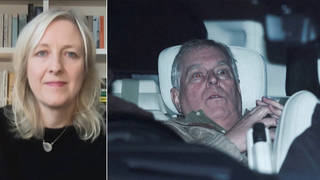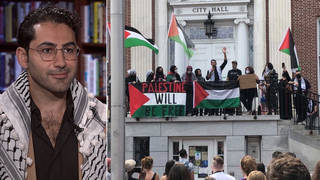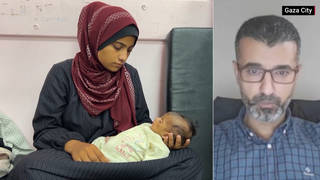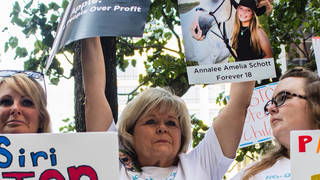
The BBC, Associated Press, Reuters and Agence France-Presse have all called on Israel to allow journalists in and out of Gaza as starvation there becomes imminent. In a statement, the news outlets said, “We are desperately concerned for our journalists in Gaza, who are increasingly unable to feed themselves and their families.” We speak with Afeef Nessouli, a journalist who just returned from Gaza, where he volunteered as an aid worker. “It has been an incredibly awful experience to see people sort of become sicker and sicker from hunger,” says Nessouli, who describes visiting community kitchens in Gaza that have run out of food. “Many of us would just have one meal a day,” he says of his seven weeks in Gaza. Now his colleagues who remain in Gaza “are having one meal every three days.”
Transcript
AMY GOODMAN: This is Democracy Now!, democracynow.org, The War and Peace Report. I’m Amy Goodman, with Nermeen Shaikh.
NERMEEN SHAIKH: The BBC, Associated Press, Reuters and Agence France-Presse have called on Israel to allow journalists in and out of Gaza. In a statement, the news outlets said, quote, “We are desperately concerned for our journalists in Gaza, who are increasingly unable to feed themselves and their families.”
Well, our next guest, who joins us in our New York studio, was reporting in Gaza for seven weeks during his off hours as he also volunteered as an aid worker for the medical nonprofit Glia, which brings doctors, nurses and others into Gaza to support local healthcare workers.
AMY GOODMAN: Afeef Nessouli is a journalist and host of With Afeef Nessouli. He’s reported from the Occupied Palestinian Territories since 2011. His most recent piece for The Intercept is headlined “Our Reporter Got Into Gaza. He Witnessed a Famine of Israel’s Making,” which he wrote with journalist and author Steven Thrasher. We last spoke to Afeef in January about their report headlined “Surviving War and HIV: Queer, HIV-Positive, and Running Out of Medication in Gaza.”
Welcome back to Democracy Now! In June, when you left, you were in Deir al-Balah, which was packed with many thousands of displaced people. Can you talk about what you saw in Gaza? And talk especially about the community kitchens and hunger, starvation, people starving to death.
AFEEF NESSOULI: Yeah. First of all, thank you so much for having me again.
I went to Gaza because of that first report, and I was there from March 27th to June 3rd. I even lost about 10 pounds to 12 pounds, because we were having one meal a day. There was rice, there was lentils, and sometimes we would have an errant can of tuna that we had brought and hadn’t passed out yet to people that were starving.
Hunger is something that I don’t think any of us here can actually fathom. I think many — maybe many of us can in the United States, but most of us can’t. And that feeling was seeing people begging all of the time, no matter where you’re walking. If you have your NGO sort of paraphernalia on, people want to know if you have tahin, flour. And I speak Arabic, and my colleagues were mostly Gazawi, and we would just really appeal to them and say, “We really don’t have flour, actually. We’re also really hungry.” Many of us would just have one meal a day. Now I’m speaking to my colleagues who are having one meal every three days often. I worked at a Glia —
AMY GOODMAN: And you’re talking about more than a month ago.
AFEEF NESSOULI: Yeah, this is more than a month ago, right. The blockade started March 2nd. I got in March 27th. By then almost, people were already rationing food. We were really, really overly thinking about what was available and what would suddenly go away if we did too much, if we ate too much.
I also volunteered at Shabab Gaza, which is a community kitchen. It was in — it’s sort of in collaboration with Glia, so a lot of us kind of do both. And at the start of this genocide, there were about 170 community kitchens. Two hundred and fifty thousand meals per day were being served. About 45% of the population was being served. By the time I was leaving, Shabab Gaza, at least, went from 250,000 meals a day to 25,000. And now they’re not operating really at all. I think that they’re operating when they can, when some farmer or someone has potatoes. The last time I was there, on June 1st, they had a bunch of potatoes, and they were passing them out and preparing them. But that’s what they had. They had potatoes.
So, it has been an incredibly awful experience to see people sort of become sicker and sicker from hunger. I even had an experience where I was sick because I just sort of had beets one day. And I don’t know, maybe I had some virus, and together, I couldn’t sort of hack it, and I became quite sick for about two or three days. So, it’s pervasive. If you’re a patient, you need protein to heal. I mean, so, if you have an explosive injury, and any injury that isn’t about malnutrition, malnutrition makes it way worse. And people now are going to the hospital because they’re malnourished. People are fainting regularly. I’m getting voice notes all the time from people who are just in hunger pain, which is hard to hear.
NERMEEN SHAIKH: And explain the Gaza Humanitarian Foundation, so many people being killed while they’re trying to access aid. What’s going on there? Were you in the vicinity of any of those aid sites while you were there?
AFEEF NESSOULI: Yeah, so, they were announced on May 19th. On May 26th or 27th — I believe it was the 26th — was the first aid distribution. It was a disaster. I remember Al-Qarara and Khan Younis were really loud that day.
The GHF has been, basically, the new sort of brainchild of the Israelis and the Americans. They kind of fight over who even created the idea. But, ultimately, there were 400 aid sites around Gaza by the U.N.-backed system, and it’s been replaced by now just four. For a while, it was three. And many of them don’t always operate. Sometimes it’s security reasons. Sometimes it’s maintenance. They have a Facebook page people check.
From my reporting and my experience, people are shot at, very regularly shot at. Doctors mention that the bullet holes seem targeted, like snipers, because they’re in certain spots in the back of the head. There’s people who are just simply trying to find food for their families, and they go in the middle of the night to start lining up. And this is for parcels that are about $1.30 in all, like medical supplies, you know, a food parcel, but all of it together is just $1.30.
And the experience, from what I understand and what I experienced there, but it’s also been more developed since I’ve left, is that there’s thousands of people just disorganizedly just hoping to find something. And when you get something, it’s also pitting you against all of your neighbors, all of your family, because you’re the one who somehow picked up this bag of flour, and now you have to somehow justify that everyone around you doesn’t get to have that flour, just you. So, a lot of people are getting into, you know, sort of tension and fights with each other. So it’s just an incredibly chaotic, awful, basically, supplantation of what was there before, which was working. Albeit it had its own flaws, it was working.
AMY GOODMAN: And you went in as a medical worker. You went in with a medical aid group and then wrote about your experience.
AFEEF NESSOULI: Yeah, so, I went in with Glia. I think that it’s really important to realize that right now Palestinian journalists are suffering because of malnourishment. But for the last year and a half, two years, they’ve been on the frontlines. I don’t think that they necessarily needed me to go in as a journalist. What they needed was someone to help on the ground, which is what I did. And as part of Glia, I also documented, did a lot of interviews with doctors and nurses and sort of gleaned this information in retrospect and have a lot of sources there still. And we’ll hopefully go back.
AMY GOODMAN: Afeef Nessouli, we want to thank you for being with us, just recently back from Gaza. We’ll link to your piece in The Intercept.
Coming up next, countries have a legal duty to limit emissions, and high emitters may be liable for reparations — the ruling of the International Court of Justice. We’ll go to the minister of climate change from the Pacific island nation of Vanuatu, that brought the case to the court. Stay with us.
[break]
AMY GOODMAN: “The Taker Story” by Chicano Batman, performing in our Democracy Now! studio.













Media Options